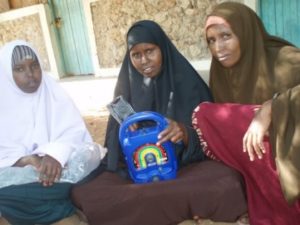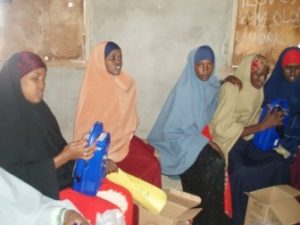
Although radio is long established and in many ways old media, it has been used very successfully in many UNDEF projects to reach marginal populations and to widely disseminate a key information.
Key lessons:
- Radio can be used to communicate messages in different local languages and dialects to people with low literacy and in remote areas.
- The accessibility and reach of radio can improve understanding of local government and development issues and can contribute to community organization to solve local problems
- Radio shows can increase a project’s visibility and enhance its advocacy efforts. Newly trained journalists can widen raise beneficiaries’ awareness of rights and can provide crucial information about livelihood and security concerns.
- Radio debates can provide a platform for the local population and civil society activists to discuss issues of community interest. They are an effective tool for women, youth and marginalized segments of the population, both as panellists and audiences, to realize that they are not alone with their issues and that they can make their voices heard.
- Ideally, radio broadcasts are produced with local communities on a continuing basis, and with links to community development activities, in order to become regular programmes and thus lasting tools for effective communication.
Use community radio to reach rural women
In Kenya, community dialogues over the radio proved effective in raising rural women’s awareness about their rights. Through radio shows highlighting women’s issues, women became aware of the fact that this practice deprived them of the possibility to vote.
From Project: Strengthening promotion of women’s rights (Kenya)

Use TV and radio to broadcast message in low-literacy areas
The CSOs were fully involved in a series of TV and radio debates both as panellists and audiences. These were a good way to give the CSOs an opportunity to speak out, to engage local journalists in the issues, and to broaden the discourse on women’s empowerment.
From Project: Promotion of Women’s Empowerment and Rights in Somalia
Radio is an effective media for communicating with a wide audience
The production of broadcasts in Togo involved a partnership with Radio Lomé, which was effective at getting messages across. The media regulation authority, the Truth and Reconciliation Commission and the Electoral Commission were involved as resource persons for training activities and content. It is recommended that the grantee continues to develop and formalize these partnerships.
From Project: Rights and freedoms for all in Togo
Use radio to reach scattered and isolated audiences
Radio programmes were considered the best media for enabling women to make their voices heard. Participants remarked on the quality of the broadcasts and the effectiveness of media outputs. Local journalists said that these programs had helped individual women realize that they were not alone in enduring discrimination, and that sharing experiences about discrimination is no longer taboo.
From Project: Enhancing Political Participation of Marginalised Women in Nepal
Use debates and broadcasts to put new knowledge into practice
The broadcasts based on the community debates complemented the training sessions on human rights and democracy. Together, they contributed to developing the capacity of the radio listeners’ clubs, so that the members had an improved understanding of democratization.
From Project: Strengthening Dialogue for Community Decision-Making